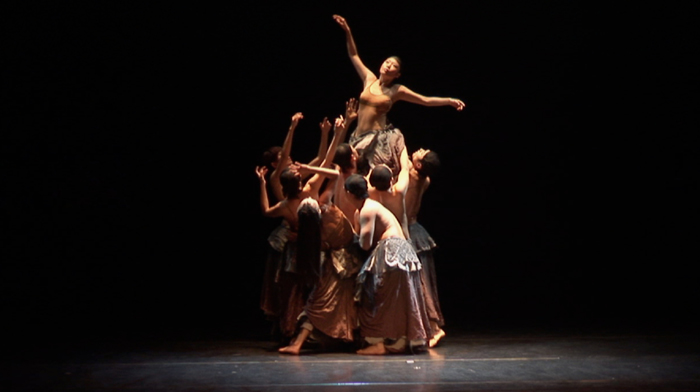
 |
|
A scene from Taste of Body. [Photo/China Daily] |
The 2012 Beijing International Film Festival may have ended on April 28. But discussion on Taste of Body, which was screened at the event, continues.
The 52-minute work is the only documentary at the festival and claims to be the first Chinese documentary about modern dance.
It is co-produced by independent filmmaker Wang Fan, and American filmmaker and Academic Award winner Allan Miller.
"It's a combination of Chinese and Western cultures. I'm just telling a story with modern dance - a common language," says Wang, who works at China Film Art Research Center. She obtained her postgraduate degree in 2006 from Beijing Film Academy, China's leading performing arts school.
The documentary records stories about Beijing Modern Dance Company's rehearsals of Offering. It shows how Gao Yanjinzi from the company and dancer and choreographer Tere O'Connor from the United States coach the dancers. It took Wang three years to finish the work, which was shot in Beijing and New York. "O'Connor and Gao represent two styles - Chinese and American. The cultural conflicts help the audiences learn the different styles of modern dance," Wang says.
"While Gao taught dancers very specific movements and steps, O'Connor would focus more on improvisational choreography - giving them certain themes and allowing them to express themselves freely, giving them the chance to be creative and imaginative," she says. The production taught her patience, because she had to wait to capture the most excellent scenes, she says. Wang says she also has to ensure the shots represented both the Chinese and Western values and emotions.
"Modern dance will always be a part of my production, because it's direct and real. It helps me touch the untouchable," says Wang, who has been dancing since she was a child.

In 2004, Wang started her career in dance filming and shot many of the local modern dance companies during her work in Paris and New York.
Her other co-production, Beijing Carmen, is a Chinese version of the classical novel Carmen. It's about a love story of a Chinese girl from an ethnic group and a 50-year-old foreign choreographer. The film won the Excellent Project prize at the festival's pitching.
"Wang's work receives a lot of praise," China Film Promotion International president Zhou Tiedong says. "Co-production seems to be the only way for Chinese films to be exported abroad.
Documentaries should also be promoted to the world. To break through, we have to seek commonality and tell good stories, which should be about Chinese people, not China."